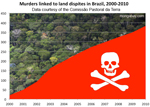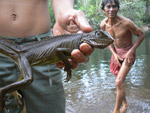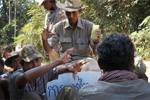![]()
Activists dress as avatars to protest the destruction of Prey Lang forest. Photo courtesy of Prey Lang: It’s Our Forest Too.
Four economic land concessions have been cancelled in Cambodia’s Prey Lang forest, known as the largest intact lowland forest in Southeast Asia, reports the Phnom Penh Post. The economic land concessions, totaling over 40,000 hectares, would have been used for rubber plantations.
Prey Lang forest is home to some 350,000 people, many from the Kuy ethnic group, who depend on its resources for their livelihoods. Most locals have vocally opposed economic land concessions in the region, including by staging protests dressed as ‘Avatars’ from the popular eco-science-fiction film, Avatar. Still even as Prey Lang is spared from new economic land concessions, locals are fighting existing ones.
Prey Lang harbors between 26 and 50 threatened mammals, birds, and reptiles including tigers, Asia elephants, banteng, gaur, and Asiatic black bears. Half of Prey Lang forest has never been logged, making it a rarity for lowland forests in Southeast Asia.
The government is currently mulling a proposal to dub over 600,000 hectares of Prey Lang and adjacent ecosystems as a protected area.
Economic land concessions have become a political minefield in Cambodia. After large-scale protests and the high-profile murder of forest activist Chut Wutty, Cambodian Prime Minister Hun Sen announced in May that he would suspend granting any new economic land concessions. But recently seven new economic land concessions were granted.
Even before the moratorium on new concessions, the Cambodia Human Rights and Development Organization (Adhoc) found that two million hectares (4.9 million acres) of Cambodia—comprising over 10 percent of the country’s total land area—had been handed over to corporation for logging, mining, agriculture, and other development through economic land concessions.
Related articles
Flouting moratorium, Cambodia approves four land concessions in protected areas
(06/27/2012) A month-and-a-half after Cambodian Prime Minister, Hun Sen, declared a moratorium on on new economic land concessions, the government has announced four new concessions, each located in protected areas. Economic land concessions have come under the microscope in Cambodia after large-scale protests by local people and the recent murder of forest activist Chut Wutty. Critics say the concessions, which last year totaled two million hectares (4.9 million acres) sold off to foreign corporations, have resulted in local land conflict and environmental degradation.
Over 700 people killed defending forest and land rights in past ten years

(06/19/2012) On May 24th, 2011, forest activist José Cláudio Ribeiro da Silva and his wife, Maria do Espírito Santo da Silva, were gunned down in an ambush in the Brazilian state of Pará. A longtime activist, José Cláudio Ribeiro da Silva had made a name for himself for openly criticizing illegal logging in the state which is rife with deforestation. The killers even cut off the ears of the da Silvas, a common practice of assassins in Brazil to prove to their employers that they had committed the deed. Less than a year before he was murdered, da Silva warned in a TEDx Talk, “I could get a bullet in my head at any moment…because I denounce the loggers and charcoal producers.”
Cambodia suspends economic land concessions
(05/07/2012) Cambodian Prime Minister Hun Sen announced today that Cambodia would be temporarily suspending new economic land concessions and would revoke any concessions from companies involved in illegal logging, the evictions of locals or land-grabbing. The announcement comes two week after the high-profile death of local forest activist, Chut Wutty, who was shot and killed by military police while investigating illegal logging with two journalists.

(05/03/2012) Abandoned by NGOs and the World Bank, carved out for rubber plantations and mining by the Cambodian government, spiraling into a chaos of poaching and illegal logging, and full of endangered species and never-explored places, Virachey National Park may be the world’s greatest park that has been written off by the international community. But a new book by explorer and PhD student, Greg McCann, hopes to change that. Entitled Called Away by a Mountain Spirit: Journey to the Green Corridor, the book highlights expeditions by McCann into parts of Virachey that have rarely been seen by outsiders and have never been explored scientifically, including rare grasslands that once housed herds of Asian elephants, guar, and Sambar deer, before poachers drove them into hiding, and faraway mountains with rumors of tigers and mainland Javan rhinos.
Assassinated forest activist Chut Wutty: ‘I want to see people live with freedom’

(05/02/2012) Chut Wutty, a dedicated Cambodian activist, was shot dead at an illegal logging site by military police, last Thursday. At the time Wutty was driving with two journalists, who wrote a shocking eye-witness account of his death, revealing that he was physically and verbally abused, then shot whilst trying to drive away, and left to die. His death reveals the brutal power of logging syndicates and companies, which are looting the country’s natural wealth, and employing the military to silence their opponents.
Forest activist shot dead in Cambodia allegedly over photos of illegal logging
(04/26/2012) Chut Wutty, a prominent activist against illegal logging and deforestation, has been killed in the Koh Kong province of Cambodia. Wutty was shot dead at a military police checkpoint while traveling with two journalists with The Cambodia Daily. The journalists are currently being held for questioning by the military police.